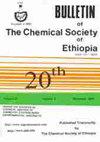Synthesis and characterization of quercetin-layer double hydroxide (LDH) nanohybrid and their enhanced antioxidant activity
IF 1.3
4区 化学
Q3 CHEMISTRY, MULTIDISCIPLINARY
引用次数: 0
Abstract
ABSTRACT. This research included the synthesis of pristine nitrate-type Zn2Al-LDH by means of Co-precipitation, which was then followed by hydrothermal treatment. Ion exchange is used to stabilize the produced pristine LDH nano layer, which is used for the encapsulation of bioactive molecules. Quercetin, which has an antioxidant function, is used. XRD was used to investigate the newly synthesized quercetin-LDH (QC-LDH) compound. Quercetin was discovered to be entirely deprotonated as a result of XRD research, and it was also shown to be stabilized in between LDH lattices as a result of electrostatic contact. On the basis of the diphenyl picrylhydrazyl (DPPH) method, the anti-oxidant property was discussed, and it was discovered that the quercetin that was free from the LDH layer helped as an owing antioxidant to scavenge DPPH radicals in ethanol solvent at concentrations ranging from 80-100%, depending on the concentration level. The powder X-ray diffraction patterns indicate that the incorporation of quercetin into the interlayer led to an expansion of the interlayer arrangement to 0.88 and 1.46 nm, respectively. According to the findings of a variety of characterization techniques, the QC-LDH may be regarded as a good antioxidant material with potential drug delivery system. KEY WORDS: Layer double hydroxide, Antioxidant activity, Quercetin, Biocompatibility Bull. Chem. Soc. Ethiop. 2023, 37(4), 917-929. DOI: https://dx.doi.org/10.4314/bcse.v37i4.9槲皮素层双氢氧化物(LDH)纳米杂化物的合成、表征及其抗氧化活性的增强
摘要本研究包括用共沉淀法合成原始硝酸盐型Zn2Al-LDH,然后进行水热处理。离子交换用于稳定生产的原始LDH纳米层,用于包封生物活性分子。槲皮素具有抗氧化功能。采用XRD对新合成的槲皮素- ldh (QC-LDH)化合物进行了表征。通过XRD研究发现槲皮素完全去质子化,并且由于静电接触,槲皮素在LDH晶格之间稳定。在DPPH法的基础上,对槲皮素的抗氧化性能进行了研究,发现槲皮素在不含LDH层的情况下,对乙醇溶剂中DPPH自由基具有较强的抗氧化能力,其浓度在80 ~ 100%之间。粉末x射线衍射图表明,槲皮素掺入中间层后,层间排列分别扩大到0.88 nm和1.46 nm。根据各种表征技术的发现,QC-LDH可能被认为是一种良好的抗氧化材料,具有潜在的给药系统。关键词:双层氢氧化物,抗氧化活性,槲皮素,生物相容性化学。Soc。阿比西尼亚人。2023年,37 (4),917 - 929 . DOI: https://dx.doi.org/10.4314/bcse.v37i4.9
本文章由计算机程序翻译,如有差异,请以英文原文为准。
求助全文
约1分钟内获得全文
求助全文
来源期刊
CiteScore
2.20
自引率
8.30%
发文量
113
审稿时长
6-12 weeks
期刊介绍:
The Bulletin of the Chemical Society of Ethiopia (BCSE) is a triannual publication of the Chemical Society of Ethiopia. The BCSE is an open access and peer reviewed journal. The BCSE invites contributions in any field of basic and applied chemistry.

 求助内容:
求助内容: 应助结果提醒方式:
应助结果提醒方式:


